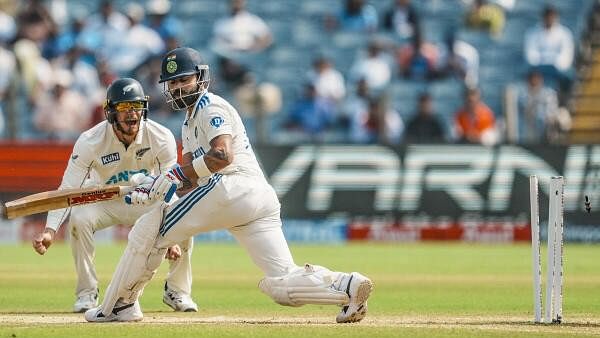
India's Virat Kohli being bowled by New Zealand's Mitchell Santner on the second day of the second test cricket match between India and New Zealand, at the Maharashtra Cricket Association Stadium, in Pune.
Credit: PTI Photo
Mumbai: One moment, India coach Gautam Gambhir says: ‘We have not lost our skill against playing spin’. Next, the former India batter admits: ‘We are not very good at defending’.
In this contradiction you can sense that Gambhir isn’t happy with how his players have played so far. He maintained that Test cricket and its purveyors have become a victim to the Twenty20 mindset and technique.
"It completely comes down to T20 cricket,” he said when asked about why the quality of a batter’s defence has deteriorated. “But, to be a successful Test cricketer you have to have a good defence. The foundation of your batting in Test cricket has to be defence and then you start taking up from there. This (lack of solid defence) probably has to do with playing on flat wickets in T20 cricket.
“So, yes (they do have problems defending), but you will see probably going forward in future, the other teams will have the same issue because the more the T20 cricket is played, the fewer people will defend.”
One of the reasons for India’s dismal showing so far has been that they do not have batters who can grind it out without losing shape. In Bengaluru, they failed to tackle the seamers by poking at the ball and covering the wrong line, and in Pune, they were shambolic in their tackling of spin.
“We need to defend better. I think that is important, especially on a turning track because if you've got confidence in your defence, a lot of things can be sorted. Again, this has a lot to do with limited-overs cricket and T20 cricket as well,” he explained.
“Sometimes you're so used to muscling the ball that you end up forgetting the soft hands and all that stuff which probably used to happen eight or 10 years back. That is why I said that a complete cricketer is a cricketer who plays the T20 format really successfully and also Test cricket really successfully. He can adapt his game, and that is what growth is. Growth is not only going about hitting the ball in the stands, it's also about batting sessions on a turning track where you know that you will not be able to hit in the stands, but you will be able to rotate better. For that, the foundation is very, very important."
At this point, Gambhir was asked if it then made sense to breed a set of cricketers solely for the purpose of playing red-ball cricket. He didn’t really have an answer.
"At the moment it's difficult to answer this question but going forward, we will have to identify players who are solid red-ball cricketers because ultimately to get the results you will have to work hard for three, four, five days. Sometimes it's important to bat sessions as well, and if you can bat sessions, we know that we've got the bowling attack to take 20 wickets. At the moment it's difficult to answer because it's a hypothetical question but, yes, identifying the right red-ball batters is very very important.”
Having spoken at length about the insidious effects of T20 cricket on Tests, Gambhir did offer the solution. “To a certain extent, yes, you can (unlearn T20 habits before Tests). To a certain extent, it has to come from the individual as well. How much value does defending a ball mean to him? That is very important. I've always believed that the best players in this format, or be it any format, always had a solid defence. It’s not an overnight thing where we're going to talk about it today and people will start getting better tomorrow.”